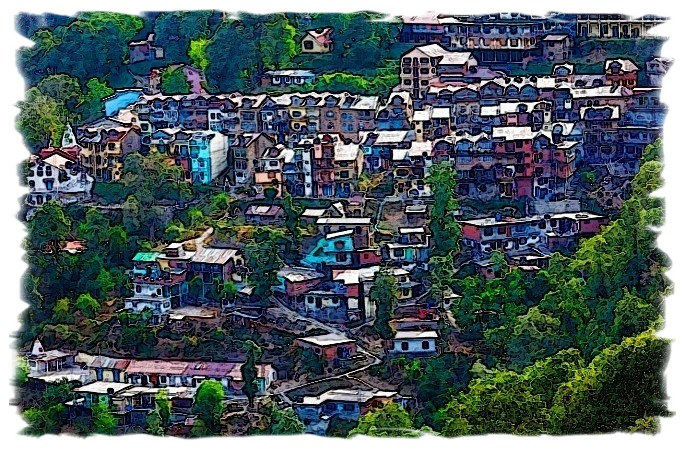If you think that culture shock is something you get only when you move to another country, think again!
1982 was a memorable year. I had accepted a job teaching English in an International School, a school nestled in the foothills of the Himalayan mountains, located in a small town in Northern India. The town, Mussoorie, was popularly known as the Queen of the Hills. The question of survival first became imminent as I made the harrowing journey up the winding mountain road with hairpin bends, which had already taken its toll on me. Would we survive in one piece? Perhaps I should say three pieces since we were the three of us! To add to the treacherous roads was my fear of heights. I sat in the middle of the back seat of the cab, holding my nine-month-old toddler tightly, not daring to look out the window, though the scenery was spectacular. My husband sat in front with the driver, to give me more space for the toddler and myself.
We had travelled from Panchgani, a small hill station close to Bombay, where I had been working in an international residential school, by a State Transport Bus, which took ten hours to Bombay. Then from Bombay to Delhi by train, which took seventeen and a half hours, and then from Delhi to Mussoorie by taxi, which took a little over eight hours. Not to mention the long walk uphill, from the school gate to our home carrying a nine-month-old toddler. You do the math!
The first home assigned to us had a scorpion’s nest just above the bed where the toddler slept. There was no water in the taps all day. Water had to be fetched from the rainwater tank outside the house. Needless to say, we requested a move to more suitable lodgings.
What follows is about the lessons learned as we were to spend sixteen years in our new home. Each time we returned from our annual holiday to Bombay, I was reminded of our initial orientation to our survival in the mountains.
Lesson One: The Bukhari
The surroundings were pristine, and the views of the mountains and the valley below were breathtaking. The altitude in the new location would prove to be a challenge for me. Our home was at a height of seven thousand three hundred feet above sea level. I found it hard to breathe. The rest of my family seemed unaffected. However, the altitude was not the only challenge. We had arrived in July, the monsoon season. It was wet and rainy outside the house, and damp and cold inside. The mists were beautiful, and the sound of the rain, poetic. One can’t survive on poetry and beauty alone! Some practical considerations must be addressed.
I had many doubts about how to do the things needed for daily living. Everything was so different here. Getting the toddler settled was a priority. I was going to work full-time and would have to find a local woman to care for him during the working day. Fortunately, there was still time for the school year to begin. Inside the home was a wood stove called a bukhari. It seemed like such a strange contraption, standing in the living room, almost like an odd part of the décor. Think of an iron pot-bellied stove with exhaust pipes leading out of the house for the smoke.
The first few logs of firewood were given to us (subsequently, we must buy the wood ourselves) by the man who brought our luggage up to the house. He lit the stove with some newspapers and kerosene. The stove spluttered and hissed, and our helper said we must place a large pot of water on the top of the main body of the stove for the steam to prevent dryness. I was certain I would never succeed in getting it to work myself. It looked quite intimidating. We would have to buy some sort of gate to protect the toddler from the hot stove once it was lit, since he was crawling at the time.
The next challenge to overcome was the issue of drying our clothes. Drying the toddler’s socks was a priority since he had only a couple of pairs. The other clothes had been placed on a wooden rack beside the stove. I asked a colleague how I could get the socks dried quickly. My colleague replied, “Dry the socks on the stove.” At least that’s what I heard. So I placed two pairs of blue and red nylon socks with white stripes, directly on the hot stove. I hoped they would get dry rapidly. Soon, a strange smell began to fill the living room. I was upstairs putting the toddler to sleep. I rushed downstairs to witness a melted mush of blue and white on the stove! My colleague had meant, “Dry the socks by the stove”, but when I thought she said ‘on’, I took it quite literally. We used a pair of tongs to retrieve the molten mush off the stove and consigned them to the trash can when it cooled.
Prepositions, when used correctly, do make a difference!
Lesson Two: The Monkeys
If the place where we came from was full of snakes, this mountain town was full of monkeys. Of course they destroyed all the flowers in the flower pots we had lovingly placed outside our home, but the greater problem was the garbage. If you put out the garbage outside the back door, even a few seconds before the garbage man arrived, the monkeys would upturn the garbage bin and sit beside it, happily munching all its contents. Once done, they would spread out all the remains and jump into the trees chattering contentedly. So, we had to hover by the kitchen window inside the house and keep watch for the garbage man. As soon as we saw him, we would open the door and put out the garbage. Sometimes he was late, and we became quite impatient. However, we knew that if the monkeys scattered the contents of the garbage bin, we would be left to pick it all up and put it back ourselves. This was not something we looked forward to.
Better to develop patience in waiting for the garbage man by the kitchen window.
Lesson Three: Landslides
When it rained heavily, it felt like the entire hillside would crumble, and we would get washed away along with the mud and the trees. One night in the year 1994, we heard a huge groaning sound. It was past midnight. The pushta, or the retaining wall, had begun to give way and fall onto the path and the staff houses below. My husband and son went out and took photographs, while I kept shouting for them to come back inside. It was a frightening experience. Another couple of inches, the house would have collapsed onto the path and the staff houses below.
Another time, we walked on the narrow path past the Landour Community Hospital, where the landslide had caved in and made a huge hole in the hillside. We had been cut off from the town for fifteen days and were developing cabin fever. So we decided to venture out, walking in single file. My husband kept warning us not to look down and to watch our steps. It was a terrifying experience. On the way back, we finally took a cab via the long way home. There was no way we would take the narrow path on the return journey.
By far the biggest disaster occurred just when we were leaving our home of sixteen years in the beloved mountain town. Two days before I made the move to settle down in a different country, it rained continuously for two nights and two days. Following the rains, there was a huge landslide. We had flights to catch, three flights to be specific, and so we had no choice but to leave. We took cabs to the edge of the landslide and then hired some labourers to carry our luggage on their heads, and holding hands, boots sinking in the mud, we crossed over the landslide to where a couple of taxis were waiting for us on the other side. My husband, one of the men, my daughter and I sat in one taxi, while my son and two other men followed behind us in another taxi. We were stopped by a policeman telling us that we were the last vehicle he would allow to pass, as the road had been completely washed away. We pleaded with him to allow the other taxi through as our son was in that one. We spoke in Hindi and finally convinced him to let the second taxi pass. For the first time, I saw a road that was washed away. I can never forget the sight of the sunken road – like a cake which sinks, rather than rises in the oven. We made it to Delhi just in time to board the flight on the first leg of our journey. I had insisted on dressing fashionably in spite of the landslide; tall high-heeled stylish black boots, long black skirt, embroidered jacket and long earrings. I regretted not dressing comfortably, which my husband had suggested. To my mind going on a plane meant you had to dress your best! Who could have imagined I would be boarding a flight with muddy boots and the hem of my skirt wet and mud stained as well!
Prepare for landslides by storing all the basic provisions and essential medications in your home. If you can avoid travelling, it would be wise to delay the journey.
Lesson Four: Fluctuating Electricity and Erratic Water Supply
It seemed like the elements had conspired to make life challenging at the most critical time in our lives. The night before leaving our home in the mountains, we placed the pizza in the oven while we continued packing. Well, the electricity went off for several hours, and we ate our supper well past midnight. During the sixteen years we spent in the mountain town, we experienced many sudden electricity shortages, using candles and flashlights to move around the house.
One year, the campus houses at the top of the hill were without water for fifteen days. Something in the system had broken down and took two weeks to repair. We went to a colleague’s house at the bottom of the campus, to bathe and wash clothes. Drinking water was carried from the school kitchen in large containers. We also had water stored in a drum in case of emergency, but this was impossible to do for fifteen days.
Candles, matches, flashlights, drinking water, and stored water for washing are important to prepare for such emergencies.
Lesson Five: Four-inch High Heels on Mountain Paths
I had always worn four-inch high heels while going to college walking on the broken sidewalks in Bombay. I ran for the bus wearing them. Whether it was driven by fashion or the blessing of the energy of youth, I literally lived in those shoes. The first hill station where I worked was a short walk from my home to the school, though it was still an uphill climb through the campus. In Mussoorie, the walk from my home to the High school was longer, with a descent down broken steps and no railing to hold on to. At first I was doing well, balancing on the shoes with my school bag in hand. Later, when the toddler began to attend the preschool, balance became more difficult. It was a juggling act with the little one and his backpack, with me and my school bag. I didn’t want to tempt fate. I decided to wear a pair of flat shoes and carried the high heels to change into, when I reached the school building. Later, when I added another child to the mix, I discarded the high heels for daily use and reserved the four-inch shoes for staff banquets and other special occasions. I followed the same practice of wearing flat shoes and changing into high heels at school.
Sensible shoes while walking in the mountains to protect your feet and ankles and prevent falls, are a must. Worrying about fashion is secondary.
Getting acclimatised to any new situation, whether in your own country or a foreign one, requires time, patience, the willingness to change and adapt to a different culture, and even a sense of humour!



